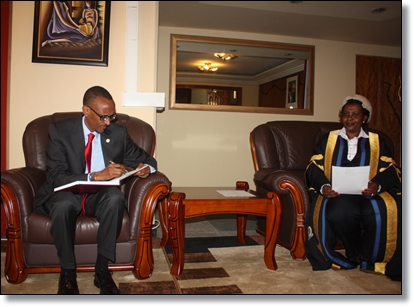East African Community Must Stop Begging - Kagame

 |
|
President Kagame signs the visitors book during the opening of the EALA Assembly as EALA Speaker, Margaret Nantongo Zziwa, looks on. |
As we focus on improved functioning of the East African Community, we must keep in sight the advantages of integration, not just in this region, but across the continent.
A better performing East African Community is good for our citizens. It would be even more beneficial if we established links with other regions of the continent so that all Africans can enjoy the benefits of larger markets, greater safety, peace and stability and collective strength.
We have already tasted the dividends of integration in this region, however limited, and have found them satisfying. It is in our best interest to multiply that level of satisfaction through enhanced cooperation. But we have also experienced the costs of acting individually where we are open to mistreatment, marginalisation or become victims of other international actors. Continental unity and integration are our best insurance against denial of our ability to play our rightful role in the world.
Africa presents us with immense opportunities for further economic growth and a stronger voice in the international arena. In this period of economic turmoil, Africa is the only region where GDP has been growing at an average of 5% per year for the last few years. We have the world’s largest reserve of natural resources. Our population is youthful and increasingly has more money to spend.
These are opportunities that we cannot permit others to benefit from more than us. However, to get maximum benefits from this situation demands that we increase the level of intra-African trade and investment and extend integration across the continent – starting, of course, as we have done at regional level.
Equally, in order to get the most out of regional and continental integration, it is crucial that we address existing weaknesses. In our case, for instance, we must ensure that commitments on the free movement of people, labour and services, which have not been fully or evenly implemented across the region, are urgently addressed. The delay as we all know has caused business people, investors and ordinary East Africans immense frustration. For the same reason, we must move fast on the creation of a single customs territory to facilitate trade across the region.
The East African Legislative Assembly in particular has a critical role to play in this regard - in enacting enabling laws and in its oversight duties. It is important that this latter function be given its due emphasis because it is central to the satisfactory performance of all Community programmes. It is important to find ways to plug the gaps in the existing laws and protocols that have an impact on the pace of implementation.
For the better functioning of the East African Community, it is crucial that the decision-making and oversight mechanisms become more responsive to the aspirations of East African citizens. This requires expediting institutional review and streamlining the functions of the organs of the Community to give them the necessary autonomy, make them more accountable and enhance complementarity.
East Africa and the continent in general must be prepared to compete on the world stage and also take full advantage of the evolving situation where new and important economic and political actors are emerging in addition to the traditional economies. This calls for a vibrant, well-informed and competitive private sector. It is therefore imperative that the relevant organs of the Community expedite the approval of the Public-Private Partnership framework and strategy to support commitments and initiatives of Partner States.
The East African Community has been in existence for close to a decade and a half, but still relies on external support from development partners to fund its activities. We must seek, as a matter of urgency, innovative and sustainable ways, from within the partner states and international private capital, of funding the Community’s priority programmes and activities, and also reduce dependence on external sources whose continuity cannot be guaranteed.
Our integration agenda will have more meaning if it gets out of government and East African Community departments and spreads to the people of partner states so that they are involved in all its activities. They must know at what stage we are, what their rights, obligations and benefits are, and what issues stand in the way of faster integration.
The responsibility to sensitise citizens belongs to EALA. I am confident that EALA members have the will, drive and commitment to discharge this duty and also make consultations with all stakeholders on various legislation in order for East African citizens to realise the full benefits of integration.
By H.E. Paul Kagame
President of Rwanda.
